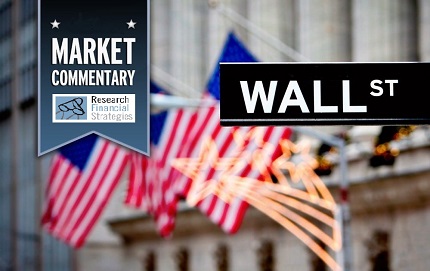If you've heard CEOs mention "A.I." multiple times during second-quarter conference calls or on the news, you're not imagining it. There have been an astounding 1,072...

Market Commentary 11/9/2020
How Are Your Investments Doing Lately? Receive A Free, No-Obligation 2nd Opinion On Your Investment Portfolio >
It’s said markets hate uncertainty, but that wasn’t the case last week.
Despite tremendous uncertainty about the outcome of the United States election, major domestic and international stock indices moved higher and the CBOE Volatility Index, better known as Wall Street’s fear gauge, moved 35 percent lower. Ben Levisohn of Barron’s reported:
“By all accounts, it should have been a terrible week for the stock market. At the close of trading on Friday, we still didn’t know whether Joe Biden or Donald Trump had won or which party would control the Senate. There was also set to be at least two recounts – one in Georgia, and one in Michigan – with likely more to come. It’s the kind of uncertainty that the market is supposed to hate.”
Yet, there was little fear to be found in financial markets. Investors’ confidence may have been grounded in a wave of positive economic news:
· 15 of 18 manufacturing industries grew in October. The ISM’s Manufacturing Purchasing Manager’s Index rose 3.9 percent in October. The Index finished at 59.3 percent, an indication manufacturing is improving and the economy is growing.
· Rates remained low. The Federal Reserve kept rates near zero, which supports economic growth. The Fed’s Open Market Committee statement indicated supportive monetary policy would continue. “The Federal Reserve is committed to using its full range of tools to support the U.S. economy in this challenging time, thereby promoting its maximum employment and price stability goals.”
· People are going back to work. More jobs were created in October than economists expected. The Bureau of Labor Statistic’s Unemployment report showed 638,000 new jobs for October. The U-3 unemployment rate fell to 6.9 percent. That’s an improvement on April’s unemployment level of 14.7 percent.
While that’s all good news, the number of coronavirus cases in the United States continued to increase last week. Randall Forsyth of Barron’s reported, “As politics at long last fades as a factor, the renewed surge in COVID-19 cases looms large…Even without renewed mandated lockdowns, however, people are apt to hunker down voluntarily…that could dampen the labor market’s recovery.”
A SALUTE TO VETERANS AND GOLD STAR FAMILIES.
This week we celebrate Veterans Day. The U.S. Department of the Interior is celebrating by giving veterans and Gold Star families free access to national parks, wildlife refuges, and other public lands, reported the U.S. Department of Veterans’ Affairs.
To gain free admission on Veterans Day 2020 – and every day after – anyone who has served in the United States Armed Forces, including the National Guard and Reserves, can show one of the following forms of identification:
· Veteran ID Card
· Department of Defense ID Card
· Veteran Health Identification Card
· Veteran’s designation on a state-issued driver’s license or state ID card
The most frequently visited National Park Service sites across the country include:
· Golden Gate National Recreation Area
· Blue Ridge Parkway
· Great Smoky Mountains National Park
· Gateway National Recreation Area
· Lincoln Memorial
· George Washington Memorial Parkway
· Lake Mead National Recreation Area
· Natchez Trace Parkway
· Grand Canyon National Park
· Gulf Islands National Seashore
Happy Veterans Day!
Weekly Focus – Think About It
“There is nothing so American as our national parks…The fundamental idea behind the parks…is that the country belongs to the people, that it is in process of making for the enrichment of the lives of all of us.”
–Franklin Delano Roosevelt, 32nd U.S. President
Most Popular Financial Stories
A.I. Is Everywhere
Happy Independence Day
The Fourth of July is just ahead – a chance for us all to get together and celebrate what makes America so special. As Americans, we have the liberty to act, speak, think,...
Wishing You a Happy Father’s Day
Let’s hear it for the dads, the ones who help us grow, give us guidance, and look out for us in a million different ways. In celebration of Father’s Day, here are some of...
The Cost of Procrastination
Some of us share a common experience. You're driving along when a police cruiser pulls up behind you with its lights flashing. You pull over, the officer gets out, and your...
This Memorial Day…
Memorial Day is a time for Americans to honor and remember those who lost their lives while serving in the armed forces. Veterans will think back on the men and women who...
Schwab’s State of Health
Are you concerned about the potential banking crisis? We are happy to announce that Schwab, our custodian for the majority of our investment accounts, is in great shape and...
Investment advice offered through Research Financial Strategies, a registered investment advisor.
* This newsletter and commentary expressed should not be construed as investment advice.
* Government bonds and Treasury Bills are guaranteed by the U.S. government as to the timely payment of principal and interest and, if held to maturity, offer a fixed rate of return and fixed principal value. However, the value of fund shares is not guaranteed and will fluctuate.
* Corporate bonds are considered higher risk than government bonds but normally offer a higher yield and are subject to market, interest rate and credit risk as well as additional risks based on the quality of issuer coupon rate, price, yield, maturity, and redemption features.
* The Standard & Poor’s 500 (S&P 500) is an unmanaged group of securities considered to be representative of the stock market in general. You cannot invest directly in this index.
* All indexes referenced are unmanaged. The volatility of indexes could be materially different from that of a client’s portfolio. Unmanaged index returns do not reflect fees, expenses, or sales charges. Index performance is not indicative of the performance of any investment. You cannot invest directly in an index.
* The Dow Jones Global ex-U.S. Index covers approximately 95% of the market capitalization of the 45 developed and emerging countries included in the Index.
* The 10-year Treasury Note represents debt owed by the United States Treasury to the public. Since the U.S. Government is seen as a risk-free borrower, investors use the 10-year Treasury Note as a benchmark for the long-term bond market.
* Gold represents the afternoon gold price as reported by the London Bullion Market Association. The gold price is set twice daily by the London Gold Fixing Company at 10:30 and 15:00 and is expressed in U.S. dollars per fine troy ounce.
* The Bloomberg Commodity Index is designed to be a highly liquid and diversified benchmark for the commodity futures market. The Index is composed of futures contracts on 19 physical commodities and was launched on July 14, 1998.
* The DJ Equity All REIT Total Return Index measures the total return performance of the equity subcategory of the Real Estate Investment Trust (REIT) industry as calculated by Dow Jones.
* The Dow Jones Industrial Average (DJIA), commonly known as “The Dow,” is an index representing 30 stock of companies maintained and reviewed by the editors of The Wall Street Journal.
* The NASDAQ Composite is an unmanaged index of securities traded on the NASDAQ system.
* International investing involves special risks such as currency fluctuation and political instability and may not be suitable for all investors. These risks are often heightened for investments in emerging markets.
* Yahoo! Finance is the source for any reference to the performance of an index between two specific periods.
* Opinions expressed are subject to change without notice and are not intended as investment advice or to predict future performance.
* Economic forecasts set forth may not develop as predicted and there can be no guarantee that strategies promoted will be successful.
* Past performance does not guarantee future results. Investing involves risk, including loss of principal.
* The foregoing information has been obtained from sources considered to be reliable, but we do not guarantee it is accurate or complete.
* There is no guarantee a diversified portfolio will enhance overall returns or outperform a non-diversified portfolio. Diversification does not protect against market risk.
* Asset allocation does not ensure a profit or protect against a loss.
* Consult your financial professional before making any investment decision.
* To unsubscribe from the Weekly Market Commentary please reply to this e-mail with “Unsubscribe” in the subject.
Investment advice offered through Research Financial Strategies, a registered investment advisor.



